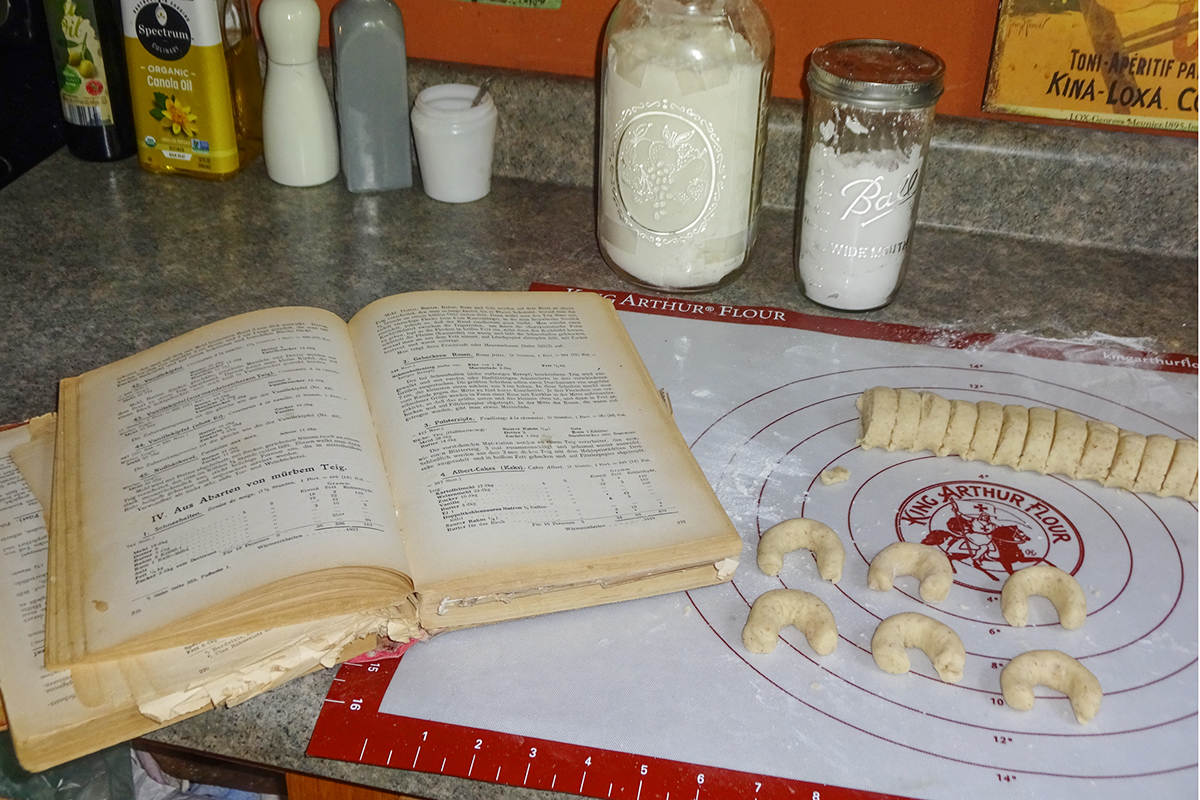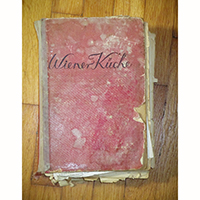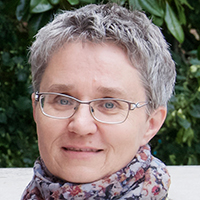
University of Illinois archivist Susanne Belovari researched the Jewish contributions to traditional Viennese cuisine. She was inspired to look more closely at the cooking she grew up with after realizing Viennese dessert recipes did not need to be adjusted to make them kosher. One such recipe, included in the Viennese cookbook "Wiener Küche," is for vanillekipferl, or vanilla crescent cookies, pictured here, which Belovari's family makes each Christmas.
Courtesy Susanne Belovari
CHAMPAIGN, Ill. — Susanne Belovari's Viennese roots, her family's culinary traditions and her years of work as a Holocaust restitution scholar contributed to her new findings on Jewish influences on Viennese cuisine. Belovari's essay is a recipient of the 2020 Sophie Coe Prize, a competitive prize awarded annually for writing on food history that offers new insights into the intersection of food and culture.
Belovari, the archivist for faculty papers at the University of Illinois Archives, previously worked as a Holocaust restitution historian and an archivist for the Jewish community in Vienna, and she considers her research on Viennese cuisine a part of her restitution work.
"This is really the restitution of history. I'm trying to return a history that was forgotten and erased to Vienna and the Viennese Jewish community," Belovari said.
In her essay "The Viennese Cuisine before Hitler – 'One Cuisine in the Use of Two Nations,'" Belovari showed how Viennese cuisine was "a collective creation, product and legacy of Viennese Jews and non-Jews alike." Belovari wrote that daily encounters between Christians and Jews and their respective culinary influences contributed to the making of the Viennese cuisine from the late 18th century until 1938. This occurred against a backdrop of early Jewish emancipation, a largely secular Jewish population and anti-Semitism.
By the late 19th century, she wrote, many paradigmatic Jewish dishes were no longer regarded as Jewish, but simply Viennese.
"The famous Wiener Küche (Viennese cuisine) had long been a collective culinary tradition of Jews and non-Jews alike. It was perhaps the perfect example, in an imperfect and anti-Semitic city, of two formerly distinct groups moving towards each other and integrating while daily creating, cooking, and eating one cuisine," she wrote.
Belovari grew up in Vienna, in a family with strong traditions in Viennese cooking. Her maternal grandmother had a coffeehouse in Vienna during World War I and created her own recipes that were passed down in the family. Her paternal grandmother was a pastry chef for an aristocratic family.
As a doctoral student at the U. of I. working for an Orthodox Jewish family, Belovari began looking more closely at the cooking she grew up with. The family asked her to help cook the many meals for the eight days of Passover. Because she was dissatisfied with typical Passover desserts, she searched through her grandmother's handwritten cookbook and the archetypal Viennese cookbook "Wiener Küche" for dessert recipes her family had used at Christmas, and was surprised to find that she didn't have to adjust the recipes to make them kosher for Orthodox Passover. She began to wonder about the Jewish influence on historical Viennese cooking.

In her essay, Belovari analyzed "Wiener Küche," an archetypal Viennese cookbook by Olga and Adolf Hess, first published in 1913. The copy of the cookbook pictured here originally belonged to a Viennese Jewish woman who took the cookbook with her when she fled the Holocaust.
Courtesy Susanne Belovari
Belovari spent 20 years researching the topic, talking with Holocaust survivors, tracking down the sources of recipes and studying a myriad of historical source material that would help uncover culinary developments traditionally ignored in historical accounts. A number of factors made the project particularly difficult, including the destruction of records during two world wars; extremely stringent privacy laws; the fact that recipes are not copyrighted; difficulties in locating female authors who changed their names when they married and did not publish otherwise; and families who hid their Jewish roots.
In addition, she said, "During the Holocaust, two-thirds of the Jews in Vienna emigrated and one-third were killed. Most of the survivors did not return to Vienna because they were not welcome."
As part of her research, Belovari discovered there were no Jewish Viennese cookbooks before 1938, although Jewish cookbooks were produced in other large cities and countries. She showed how this absence is indicative of a cooking tradition in Vienna that was the product of Jews and Christians working together, using the same terms and ingredients. Jewish and non-Jewish religious holiday dishes and ingredients became interchangeable. For example, a recipe calling for lard is not necessarily non-kosher because the term can refer to a variety of types of lard, Belovari said. A bread typically eaten at Passover is referred to as "Easter bread" and is eaten for that Christian holiday, too. And a Jewish children's rhyme about a Jewish holiday calls for eating both a prototypical Jewish dessert and a doughnut eaten by Catholics before Lent.
Part of her investigation shows how the National Socialist government heavily influenced what was published, even cookbooks. A Jewish woman who wrote a well-known Viennese cookbook was forced to rescind her rights to the book in 1938, and it was republished under the name of a male author for the next three decades, Belovari said.
The persecution of Jews and the Holocaust "helped erase all knowledge about the common cuisine," she wrote.
The Sophie Coe Prize judges wrote that Belovari's essay was not "a mere study of cookbooks."
"Belovari offers a profound and disturbing view of the strengths and limitations of cross-cultural exchanges. This work is ultimately about the power and limits of hyphenated identities," they wrote. "Despite the fact that the Jews and the Christians in Vienna both shared a single cuisine, and according to Belovari that this cuisine was fundamentally structured around Jewish culinary traditions, including those dictated by the requirements of kosher kitchens, this was not enough to save the Jewish community from total destruction at the hands of its Christian neighbors."







